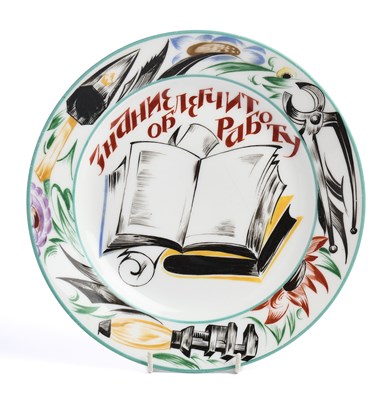23rd May, 2024 11:00
European Objects & Works of Art
28
A SOVIET PROPAGANDA PLATE, 'KNOWLEDGE LIGHTENS WORK', STATE PORCELAIN MANUFACTORY, PETROGRAD, 1921
designed by Rudolf Vilde, painted onto an Imperial Porcelain Manufactory blank with books and a diploma below the motto in Cyrillic to the cavetto and worker's tools of pliers, trowel and vice between stylised flowers to the rim with green line borders, underside with blue hammer & sickle, cog and 1921 and Imperial cipher obliterated in green, 23.5cm diameter
Rudolf Fyodorovich Vilde (1868-c.1942) was a prolific artist for the State Porcelain Manufactory, producing dynamic designs under the influence of Chekhonin. Born in Friedrichstadt, Courland, he graduated from the Stieglitz School of Technical Drawing, St Petersburg, in 1899, followed by further study on a scholarship to France, Germany and Italy before joining the Imperial Porcelain Factory in 1905, taking charge of the artistic workshops the following year. One of the few artists to remain through the revolution, he was made head of the painting workshops, becoming director of the factory in 1930, but falling foul of Stalin’s regime in about 1936 he seems to disappear from the scene and the date of his death remains uncertain.
Vilde's original design is held by the Museum of the Imperial Porcelain Factory (State Hermitage, St Petersburg, MZ-G-102) and illustrated in 'Circling the Square, Avant-Garde Porcelain from Revolutionary Russia', Tamara Kudryavtseva, London, 2004, p.160.
Sold for £10,500
designed by Rudolf Vilde, painted onto an Imperial Porcelain Manufactory blank with books and a diploma below the motto in Cyrillic to the cavetto and worker's tools of pliers, trowel and vice between stylised flowers to the rim with green line borders, underside with blue hammer & sickle, cog and 1921 and Imperial cipher obliterated in green, 23.5cm diameter
Rudolf Fyodorovich Vilde (1868-c.1942) was a prolific artist for the State Porcelain Manufactory, producing dynamic designs under the influence of Chekhonin. Born in Friedrichstadt, Courland, he graduated from the Stieglitz School of Technical Drawing, St Petersburg, in 1899, followed by further study on a scholarship to France, Germany and Italy before joining the Imperial Porcelain Factory in 1905, taking charge of the artistic workshops the following year. One of the few artists to remain through the revolution, he was made head of the painting workshops, becoming director of the factory in 1930, but falling foul of Stalin’s regime in about 1936 he seems to disappear from the scene and the date of his death remains uncertain.
Vilde's original design is held by the Museum of the Imperial Porcelain Factory (State Hermitage, St Petersburg, MZ-G-102) and illustrated in 'Circling the Square, Avant-Garde Porcelain from Revolutionary Russia', Tamara Kudryavtseva, London, 2004, p.160.
Auction: European Objects & Works of Art, 23rd May, 2024
Viewing
PUBLIC EXHIBITION
Monday 20th May 10:00pm - 8:00pm
Tuesday 21st May 10:00am - 5:00pm
Wednesday 22nd May 10:00am - 5:00pm




